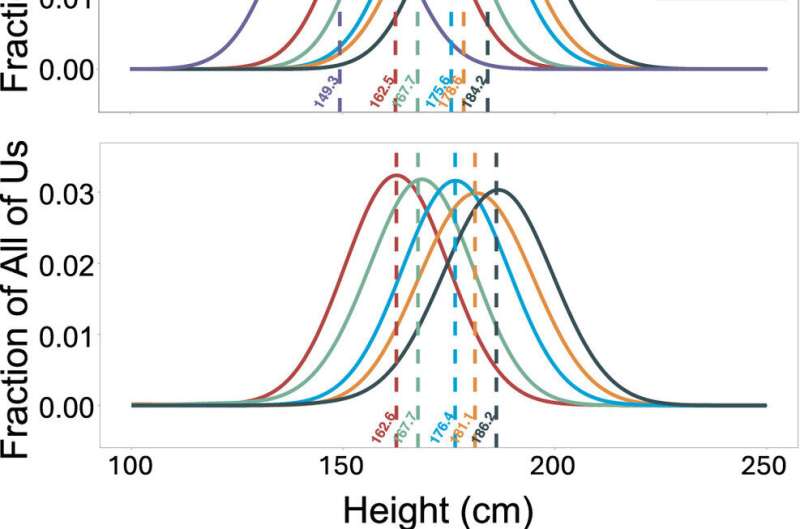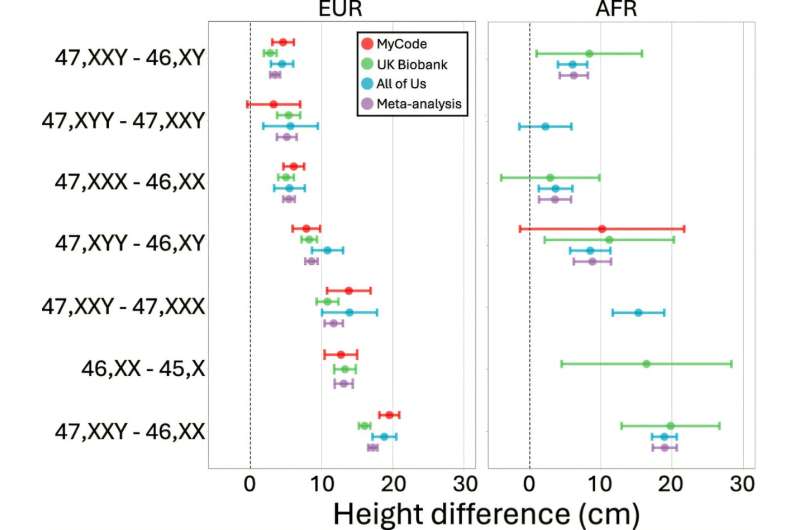Height is one of the most evident sex-based differences observed in humans, as men are on an average 13 cm (5 inches) taller than women. Sex hormones certainly play a significant role in driving this dimorphism, but they are not the only factors at play.
While scientists have long suspected that genetics contribute to these differences, the biological mechanisms behind this sexual dimorphism independent of hormones remained unclear, until a team of researchers from the U.S. shed some light onto it with their study published in PNAS.
The team analyzed a large-scale dataset with 928,605 adult participants, including 1,225 adults with sex chromosome aneuploidies (SCAs)—genetic conditions where individuals have an abnormal number of X or Y chromosomes, either extra or missing.
They found that having an extra Y chromosome led to a greater increase in height compared to an additional X chromosome, regardless of the influence of male hormones.
The sex chromosomes X and Y are non-homologous, meaning they do not share many gene sequences or structures, but both contain a gene called SHOX located in pseudoautosomal region 1 (PAR1), a small section where X and Y chromosomes share sequence identity and work like a regular chromosome. The SHOX gene is a key player in influencing height.

In human females, most of the X chromosome is inactivated, except for PAR1, which escapes X-inactivation, and both human males and females typically have two active copies of PAR1 genes.
Research indicated that the SHOX and other genes in the PAR1 region have lower levels of expression in the inactive X chromosome (Xi), suggesting they are only partially protected from silencing.
This partial silencing means that males (46,XY) may have higher levels of SHOX since it is expressed in both the X and Y chromosomes, compared to females (46,XX) with two X chromosomes. This difference in gene expression is especially noticeable in musculoskeletal tissues, thus explaining sex differences in growth and height.
The researchers collected data from three genetic biobanks—MyCode and All of Us from the U.S. and the UK Biobank— and compared the heights of 928,605 adult participants, including those with SCAs (45,X; 47,XXY; 47,XYY; 47,XXX). They used multivariate linear regression, a statistical data analysis tool, to model the effects of the inactive X chromosome, the Y chromosome, male sex hormones, and clinical features linked to genetic disorders like Klinefelter and Turner.

The findings indicated that the height contribution of the Y chromosome was larger than that of a second X chromosome, irrespective of hormonal differences.
The presence of extra chromosome Y in men might explain up to 22.6% of the average height difference between males and females, a pattern consistent across diverse ancestry groups. Additionally, pathogenic SHOX variants were found to reduce height more significantly in males than in females.
The researchers highlight that understanding genetic underpinnings of sex dimorphisms is crucial not just for traits like height, but also for uncovering the biological mechanisms behind sex-based disparities in the occurrence of autoimmune, neuropsychiatric, and other medical conditions.
More information:
Alexander S. F. Berry et al, X and Y gene dosage effects are primary contributors to human sexual dimorphism: The case of height, Proceedings of the National Academy of Sciences (2025). DOI: 10.1073/pnas.2503039122
© 2025 Science X Network
Citation:
Y chromosome found to play key role in making men taller than women (2025, May 21)
retrieved 24 May 2025
from https://medicalxpress.com/news/2025-05-chromosome-play-key-role-men.html
This document is subject to copyright. Apart from any fair dealing for the purpose of private study or research, no
part may be reproduced without the written permission. The content is provided for information purposes only.


